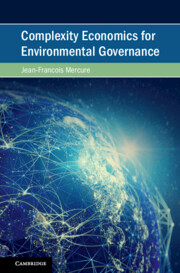Book contents
- Frontmatter
- Contents
- Figures
- Tables
- Preface
- Acknowledgements
- Part I The State of Knowledge and its use in Environmental Economics
- Part II A Positive Theory for Complexity Economics
- Part III Applied Complexity Economics for Environmental Governance
- 12 Risk-Opportunity Analysis for Transformative Policy Design and Appraisal
- 13 A Science–Policy Interface for the Energy–Water–Food Nexus
- 14 Technology Dynamics in a Rapid Low-Carbon Transition
- 15 Macroeconomics and Structural Change in a Rapid Low-Carbon Transition
- 16 Conclusions and Outlook
- References
- Index
15 - Macroeconomics and Structural Change in a Rapid Low-Carbon Transition
from Part III - Applied Complexity Economics for Environmental Governance
Published online by Cambridge University Press: 03 November 2022
- Frontmatter
- Contents
- Figures
- Tables
- Preface
- Acknowledgements
- Part I The State of Knowledge and its use in Environmental Economics
- Part II A Positive Theory for Complexity Economics
- Part III Applied Complexity Economics for Environmental Governance
- 12 Risk-Opportunity Analysis for Transformative Policy Design and Appraisal
- 13 A Science–Policy Interface for the Energy–Water–Food Nexus
- 14 Technology Dynamics in a Rapid Low-Carbon Transition
- 15 Macroeconomics and Structural Change in a Rapid Low-Carbon Transition
- 16 Conclusions and Outlook
- References
- Index
Summary
The world is on the verge of undergoing a large-scale energy system transformation. Past and present climate policies have had sufficient impact on technology that energy systems will unavoidably be affected. Governments nevertheless face a choice between whether to support climate policy in their countries to accelerate the transition or attempt to slow down progress in the climate agenda. No government can fully control the world’s energy system, while innovation is global. An important political economy issue emerges with the ongoing peaking in fossil fuel use and the pending decline of the fossil fuel socio-technical regimes. Financial, economic and political instability lies in the balance. Different countries are affected very differently by this technological transition, where fossil fuel exporters stand to lose substantial economic activity while energy importers have no regrets and only see opportunities. In this chapter, an in-depth analysis is made of the economic and financial impacts of the end of the Age of Oil and other fossil fuels. Risks and opportunities are identified, revealing striking narratives of disruptive structural change and an evolution of economic and geopolitical power across the world. Reflections are given regarding policy to mitigate the socio-economic and financial impacts of the transformation.
- Type
- Chapter
- Information
- Complexity Economics for Environmental Governance , pp. 373 - 402Publisher: Cambridge University PressPrint publication year: 2022



